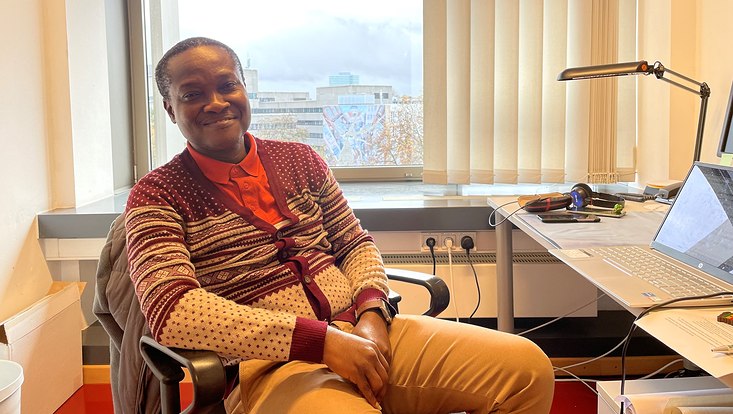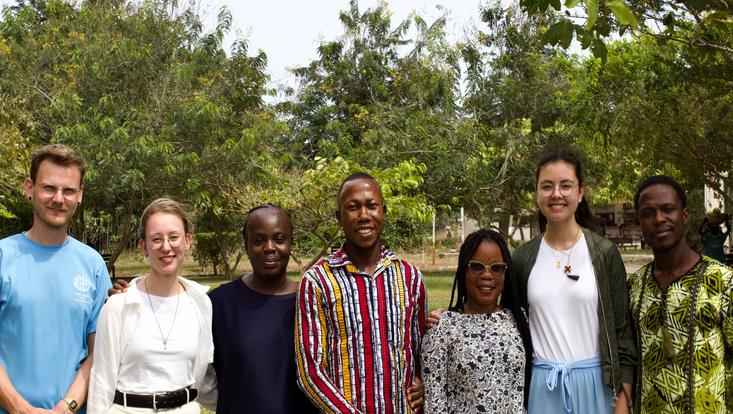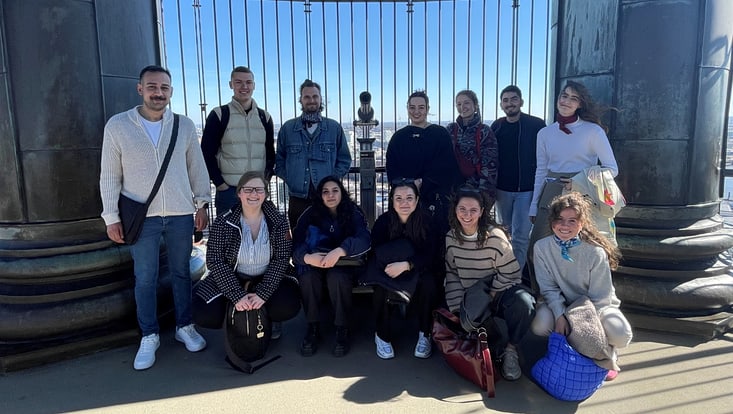Interview mit Gastdozent Prof. Dandy George Dampson aus Ghana
12. Dezember 2023

Foto: UHH/Kunze
Prof. Dampson von der University of Education in Winneba, Ghana unterrichtet im Rahmen einer Gastdozentur im Wintersemester 23/24 an der Fakultät. Die Gastdozentur ist Teil eines Abkommens zwischen UEW und UHH. Wir sprachen mit Prof Dampson über Kulturschocks, die Lehre und seine Forschung.
Dear Prof. Dampson, thank you for your time! To get started, what is your background and where are you from?
I graduated from University of Northampton in the UK with a PhD in Teacher Education and Educational Administration and Management. For the past 17 years I have been teaching at the University of Education in Winneba, Ghana, training teachers at different study levels. I am also involved in research and the curricular development for teacher education as well as in other administrative activities.
I used to serve as Director for the Teacher Education and Continuing Professional Development, and quite recently moved on to be Dean of the Faculty of Educational Studies and am also the liaison for several of our exchange partners, like UHH.
Wonderful! And can you tell us, what is the purpose of your stay at the Faculty of Education?
I am here as a guest lecturer as part of the MoU between UHH and UEW from September 2023 to February 2024. Our agreement has other components which we have been fulfilling for about 5 years already, namely the student mobility for internships through the DiCoT and TTT projects. There is also an aspect of the agreement for the facilitation of conferences. We have already organized two of them in Ghana and two to three in Hamburg, the last one being the Network Conference held here in September. A component we were waiting to still activate was guest lectureships, so Prof. Telse Iwers and myself applied for funding at the DAAD and were successful.
What projects are you involved in during you stay?
I am here as a guest lecturer, so I am offering 4 seminars while teaching at UHH:
- Firstly, I teach a course on Appreciating Culture and Diversity as a Teacher, which is aimed at students enrolled in the Master of Teacher Education. I bring in my experience from Ghana and other places to the students here.
- The second Seminar, Vorbereitungsseminar GS: DiCoT Praktikum: Preparing for International Internship, is for students involved in the DiCoT project and aims to prepare them for their orientational internship abroad.
- The Third seminar is on Intercultural and International Teacher Education. I believe the classroom is increasingly becoming a transnational place, so teachers need to be able to fit into any classroom they may be teaching in, be it in Germany or abroad.
- Lastly, I am teaching the seminar Teacher Education in Ghana: the beginning, changes and the current state .
Additionally, I am also involved in the project preparations for the next rounds of exchange in the TTT and DiCoT projects and will also hold a lecture on Teacher education in Ghana for interested staff and students of the faculty.
That seems like a full schedule! Are the topics of your seminars representative of the research you are currently involved in?
Early on in my career I focused my research on educational leadership and management as I believe that it is through leadership that schools can make changes. This included research leadership styles and theories, educational administration and decision making and how it can affect the management and improvement of schools.
More recently, I have moved towards the topics of Culture and diversity with a focus on trans-culturalism and transnational teacher education. Currently I am looking at ways in which we can teach students to become transnational teachers.
I am involved in 5 research projects at the moment:
- The Government of Ghana has banned caning a few years ago, however, the practice is still in use in some schools, so myself, Prof Hayford [AK1] and Prof Iwers have written a proposal on how to implement positive management strategies for teachers in schools. The topic is: Teacher Positive Behaviour Management Strategies Repertoire: Closure of Caning in Basic Education Institutions in Ghana
- We are also working on: The Transformation of Students’ Field Excursions to Ghana into an Exchange Program: A SWOT Analysis of Universität Hamburg and University of Education, Winneba
- There are two book chapters were are writing: Exploring “transcultural” and preservice teacher training: The lived experiences of preservice teachers from University of Hamburg and University of Education, Winneba
- The other chapter of the book is: The multipliers: effect of the TTT project on Preservice teachers in UEW.
- Finally, with my team in Ghana, we looked at utilization of PBL in universities and colleges of education.
Thank you for the overview.
Would you mind going a bit into detail on how you have experienced living and teaching in Germany so far?
I came to Hamburg to work, so for the first weeks of my stay here, I did just that, work and get settled within the culture of Hamburg. I wanted to make sure that the DAAD funding was used properly and that I put my best effort into my teaching and into the projects I am engaged in.
At the university, I was very warmly welcomed by Prof Telse Iwers, whom I have known for a long time, but also by Myriam Hummel from the International Office and Franziska Glaser from HR, who have helped me with the administrative matters of my stay here.
My students are also fantastic. I feel like a few were a bit unsure of their English level at the beginning of the classes but I tried to encourage them to speak and practice the language in the course. It took me a while to blend my Ghanaian style of teaching with the ways of teaching a seminar in Germany, as classes in Ghana tend to have around 100 students compared to the small class sizes and the involvement of students in the course is more interactive here than in Ghana.
From the third week of the semester onward, I involved students through presentations and the students’ effort in presenting well researched subjects was very motivating as it makes me learn from their presentations.
And how are you liking Hamburg and Germany?
When I was a child, I was inspired by a German called Dick Zimmermann, who came to Ghana and left me with a flute, which made me want to come to Germany for a long time to know more about who they are. In the past I have been to Germany for conferences and short educational trips but this is the first time being in the country for a longer period and I have to admit that I was affected by culture shock in the beginning of the semester. Just being immersed in the German language and not being able to read or understand anything, was quite overwhelming, so I decided to try and learn some bits and pieces of the language to gain an understanding for the culture as well.
I have also been working on my cooking skills by combining German and Ghanaian dishes, baking and just experimenting with flavors and recipes.
My colleagues have also made sure to introduce me to Hamburg and to show me around. The weather however is something I’m getting used to coming from Ghana. I believe that to fully experience a culture, one should go to a place in winter, as it is a completely different experience than in the summer.
To sum up, could you tell us, what you wish to have accomplished when you go back home?
I want to make sure that the funding for my time here was used judiciously and that I use my stay here to further strengthen the bond of our partnership and seek for further collaborations and funding opportunities. I wish to also use the multiplier effect and speak at other universities in Europe on transnational teacher education. I have already been invited to Universität of Passau and Potsdam.
Crossing borders to come to Germany has also exposed me to a new dimension on my research interest on transnational teacher education, so I wish to further deepen my knowledge and skills in this area of teacher education, research and disseminate my knowledge beyond Ghana and the rest of the world. I am grateful to DAAD, Universität Hamburg (Faculty of Education), Prof. Dr. Telse Iwers and all the staff members for welcoming me.


